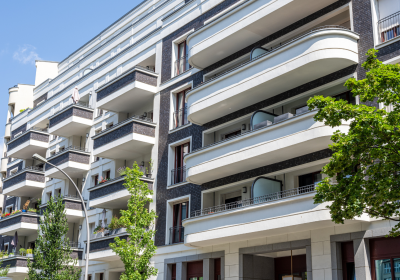How can you make sure a campus environment gives its students the ability to reach their friends and family without worrying about dropped calls? You can make your campus a “no dead zone” and help your residents stay in touch with their loved ones.
But how?
Let’s start by telling you what a cell phone booster is in simple terms and how it can help your campus residents. It is a great way to elevate your devices, like your cell phone, tablets, hotspots, and other cellular-connected devices. A cell booster will amplify the cellular signal and improve cell-related things, such as:
- Reduces dropped calls
- Improves voice quality
- Increases data speed
- Amplifies sound
When confronted with low-quality cell signal issues, a property manager should be aware of some common reasons for poor cell signal issues, such as:
- Bad weather conditions
- Excess traffic on the carrier network
- Physical remoteness of a property from the cell tower
- Dense urban development
- Interference from construction in the area
- Signal-blocking materials (Low-E Glass, Metal, Brick, Concrete)
When these issues arise, a cell phone amplifier can provide reliable connections to cell phone networks and mobile devices to users that reside on campus.
Here are some key components of how a booster/amplifier works:
- Outdoor antenna (also known as a “donor” antenna) Points in direction of carrier cell tower
- The Signal booster – typically located in an MDF/IDF closet in the building.
- Indoor antennas – Placed throughout the facility to distribute the signal
The outdoor antenna captures a robust signal from a nearby carrier cellular tower. This signal is then received by the booster and effectively distributed throughout the facility using indoor antennas. Referred to as a distributed antenna system (DAS), the cell booster plays a vital role in overcoming challenges that lead to weak signals within buildings, such as building materials and tower placement.
What are the benefits of having an amplifier for your campus?
Battery/power management – weak cell signals can drain the battery life and waste power. But with an amplifier, you can provide a strong signal due to the use of an amplifier.
Amplified and reliable connections are not only great for students; an amplifier gives business owners the ability to connect quickly to customers, teammates, vendors, clients, and stakeholders. A spotty cell signal can break important connections that rely on cellular communication.
Another key feature of having a strong signal on your campus is that there will be a stable connection to emergency services. A stable cell connection can make a huge difference in an emergency situation.
What is the difference between cell phone amplifiers and small cell technology?
Most likely, students on your campus are using cell phones that use the current 5G networks, which means more data is being used. Amplifiers/repeaters are the best way to deal with this issue. You could also use a small cell network to enhance the indoor cellular signal. A small cell network is powered by antennas called nodes, and they operate similarly to a mini cell phone tower.
However, small cell technology does have some disadvantages:
- Cost – Typically much more expensive
- Smaller Coverage Area, more equipment needed to cover facility
- Smaller Coverage Area, more equipment needed to cover facility
- Carrier Specific
- Smaller Coverage Area
- Limited Capacity
- Recurring monthly fees
- Clutter – excess antennas
- It may require permits
- Frequency exposure may cause health issues
Students living in dorm rooms may also experience cell phone disturbances due to the surrounding buildings. For example, older facilities that are built from heavy stone or brick can block cell phone signals, and modern buildings are generally constructed from steel rebar, which can create a Faraday cage effect and prevent cell signal penetration through the walls.
Most public buildings were built in the early 50s and 60s, so the materials used will likely be an obstacle for cell phone signals.
A cellular amplifier can help cell phone signals travel through building materials and give your campus residents a clearer signal with better audio.
Adequate donor signal reduce noise.
Amplifiers add “noise” to the existing noise floor from the donor signal. This signal will travel from campus units and boost call clarity between 6 dB and 8 dB’s, which increases the signal-to-noise ratio.
When will a signal booster NOT work for your campus?
- You have no existing signal outside. A signal booster only works if there is an available cell signal outside of the living quarters. A booster will not be helpful when radio frequencies are not available inside the home OR picked up from a driving distance (very inconvenient).
- Boosting reception is typically meant to help with reception indoors, so an amplifier may not be helpful for outdoor use, such as relaxing outdoors or working in the garden.
- The amplifier may not be weather-proof and needs to be plugged into a power source.
- Amplifiers are designed to improve voice cellular connectivity but not necessarily improve internet speeds. So, if you are looking to advance the speed of your WiFi, there will be better choices for you.
Having incredible cellular connectivity is not just for students on campus. Staff, administrators, and educators depend on their phones’ connectivity. It is an essential part of their daily work and staying connected.
Cell phones are used to stay in touch with those around you, both socially and for connecting with students for educational purposes and connections with students.
Cell phones are a critical part of today’s society. They keep us in touch with all of those around us. Students not only use them to stay in touch with their friends, loved ones, and classmates, but they rely on them to contact their educators, professors, and teachers to forward their shining academic goals.
An amplified cell system on your campus will help students and staff stay connected and have an all-around better experience in the educational world.
Cellular carriers cannot solve all coverage problems, but a cellular amplifier can boost cell signals to create a better-connected campus. Student connections are crucial to having a safe and reliable campus.
Groove Technology Solutions can provide you with all your cell phone amplification needs if you are looking for a technological solution to amplify your cellular connection on campus. Contact us today!


